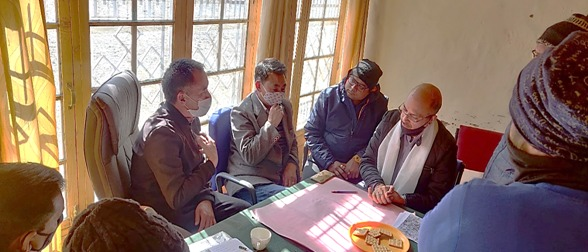Both the Union territories of Jammu & Kashmir and Ladakh plan to provide tap water connections to every rural household by 2022, when India celebrates its 75 year of Independence.
To help the UT Administration, a multidisciplinary team from National Jal Jeevan Mission comprising of officials of the ministry and experts visited Ladakh to help in implementation of Jal Jeevan mission in the UT and to speed up the same.
The team visited Stok village, situated at an altitude of 3,500 metres and interacted with the local community including Sarpanch, members of Village Water & Sanitation Committee (VWSC) along with officials of Public Health Engineering Deptt. The team assessed the potential of using the existing hand pumps to provide household tap connections with the local community to own, manage, operate and maintain to ensure regular and long-term water supply in their homes.
Making provision for household tap water connections in the difficult terrain of Ladakh becomes more challenging owing to its sub-zero atmospheric condition as well as only 5-6 months working season.It’s the endeavour of the mission to make use of advanced technology so that water supply in households during sub-zero temperature can be ensured. Emphasis is given to build low-cost gravity-based water supply systems with low operation and maintenance cost. The distribution pipelines need to be laid underground to avoid freezing due to very low temperature and subsequent bursting.The UT is encouraged for conjunctive use of water by relying on both streams as well as ground water sources to make sure there is no shortage of water even during snowfall.
The mission gives highest priority to provision of potable water supply to every home. The water testing laboratories are being opened to general public for testing of their water samples on nominal charge. Gram Panchayat/ VWSC/ Paani Samiti are trained to test water using kits, and data is uploaded concurrently, it will help in ensuring potability of water. Thus, by integrating these laboratories and making them open to general public will help in ascertaining potability of water supplied through taps. The mission ensures supply of kits to the community, identification of at least five persons preferably women in every village viz. ASHA and Anganwadi workers, school teachers, VWSC/ Paani Samiti members, etc. and training them for Field Test Kit (FTK) use so that water supplied in villages could be tested locally. The idea is to put in place a reliable and trustworthy arrangement of potable supply.
The UT administration of Ladakh is imparting training to Gram Panchayat and VWSC members for use of field test kits. During the visit of the NJJM team, village community and PHED officials were showed how8 basic water quality parameters viz. pH, Fluoride, iron, nitrate, phosphate, hardness, turbidity, etc. can be tested
The soul of the programme is community participation with focus on the planning of the water supply scheme in the village to its operation and maintenance. Every village is taken up as a unit and Village Action Plan (VAP) for five years is being prepared for each village by participation of local community with mandatory components viz. strengthening of local drinking water sources; in-village water supply infrastructure to provide tap water connections; grey water treatment and reuse; and operation & maintenance of water supply systems so as every family gets assured supply of potable water.
National Jal Jeevan Mission, Dept. of Drinking Water & Sanitation will carry out assessment of household tap connections every year for their ‘functionality’ i.e. adequate quantity of water and of prescribed quality on regular basis supplied to each rural household. This means focus is on ‘service delivery’. This year the assessment will be undertaken during November-December, 2020. Union Government’s flagship programme, Jal Jeevan Mission being implemented in partnership with States aims to provide tap water connections to every rural household of the country by 2024. The objective of the mission is to ensure every household in every village/ habitation gets a functional tap connection and ‘none is left behind’.

